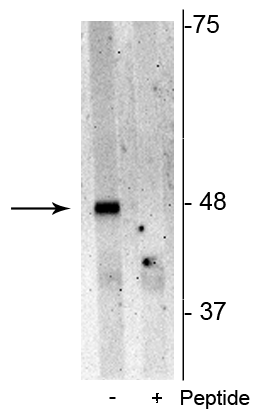Anti-p62 (Ser28) Antibody
Our Anti-p62 (Ser28) rabbit polyclonal phosphospecific primary antibody from PhosphoSolutions is produced in-house. It detects human p62 (Ser28) and is antigen affinity purified from pooled serum. It is great for use in WB.

Western blot of Jurkat cell lysate showing specific immunolabeling of the ~48 kDa p62 phosphorylated at Ser28 in the first lane (-). Phosphospecificity is shown in the second lane (+) where immunolabeling is blocked by preadsorption of the phosphopeptide used as antigen, but not by the corresponding non-phosphopeptide (not shown).
Click on image to zoom
SKU: p196-28
Ships: 1-2 business days
Product Details
p62 (Ser28)
p62, also known as sequestosome1 (SQSTM1), is a shuttle protein transporting polyubiquitinated proteins for both proteasomal and lysosomal degradation. p62 is an integral component of inclusions in brains of various neurodegenerative disorders, including Alzheimer disease (AD) neurofibrillary tangles (NFTs) and Lewy bodies in Parkinson disease (Nogalaska et al., 2009). p62 plays an important role in the protection of cells from the toxicity of misfolded proteins by enhancing aggregate formation especially in the later stages (Nakaso et al., 2004). Phosphorylation of Ser-28 has recently been demonstrated to be related to the pathogenesis of Parkinson’s disease.
Antigen Affinity Purified from Pooled Serum
Polyclonal
IgG
WB
Rabbit
SQSTM1
48 kDa
Synthetic phospho-peptide corresponding to amino acid residues surrounding Ser28 of human p62, conjugated to keyhole limpet hemocyanin (KLH).
Human
Human
Non-Human Primate
AB_2492197
Storage at -20°C is recommended, as aliquots may be taken without freeze/thawing due to presence of 50% glycerol. Stable for at least 1 year at -20°C.
Liquid
Prepared from pooled rabbit serum by affinity purification via sequential chromatography on phospho and non-phosphopeptide affinity columns.
10 mM HEPES (pH 7.5), 150 mM NaCl, 100 µg per ml BSA and 50% glycerol.
WB: 1:1000
Unconjugated
Specific for endogenous levels of the ~48 kDa p62 protein phosphorylated at Ser28. Immunolabeling is blocked by preadsorption with the phosphopeptide used as antigen, but not by the corresponding non-phosphopeptide.
Phosphorylated
Ser28
Western blots performed on each lot.
For research use only. Not intended for therapeutic or diagnostic use. Use of all products is subject to our terms and conditions, which can be viewed on our website.
After date of receipt, stable for at least 1 year at -20°C.
A170 antibody, DMRV antibody, EBI 3 associated protein of 60 kDa antibody, EBI 3 associated protein p60 antibody, EBI3 associated protein of 60 kDa antibody, EBI3 associated protein p60 antibody, EBI3-associated protein of 60 kDa antibody, EBIAP antibody, FTDALS3 antibody, MGC127197 antibody, ORCA antibody, OSF-6 antibody, Osi antibody, OSIL antibody, Oxidative stress induced like antibody, p60 antibody, p62 antibody, p62B antibody, Paget disease of bone 3 antibody, PDB 3 antibody, PDB3 antibody, Phosphotyrosine independent ligand for the Lck SH2 domain of 62 kDa antibody, Phosphotyrosine independent ligand for the Lck SH2 domain p62 antibody, Phosphotyrosine-independent ligand for the Lck SH2 domain of 62 kDa antibody, PKC-zeta-interacting protein antibody, Protein kinase C-zeta-interacting protein antibody, Sequestosome 1 antibody, Sequestosome-1 antibody, SQSTM 1 antibody, SQSTM_HUMAN antibody, Sqstm1 antibody, STAP antibody, STONE14 antibody, Ubiquitin binding protein p62 antibody, Ubiquitin-binding protein p62 antibody, ZIP 3 antibody, ZIP antibody, ZIP3 antibody
8878
Blue Ice
- Western Blot Protocol: Download
General References
- Nogalska, A., Terracciano, C., D’Agostino, C., Engel, W.K. and Askanas, V., 2009. p62/SQSTM1 is overexpressed and prominently accumulated in inclusions of sporadic inclusion-body myositis muscle fibers, and can help differentiating it from polymyositis and dermatomyositis. Acta neuropathologica, 118(3), pp.407-413. PMID: 19557423
- Nakaso, K., Yoshimoto, Y., Nakano, T., Takeshima, T., Fukuhara, Y., Yasui, K., Araga, S., Yanagawa, T., Ishii, T. and Nakashima, K., 2004. Transcriptional activation of p62/A170/ZIP during the formation of the aggregates: possible mechanisms and the role in Lewy body formation in Parkinson's disease. Brain research, 1012(1-2), pp.42-51. PMID: 15158159


